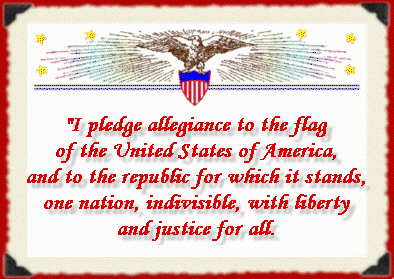Some evangelical fundamentalist Christians and many conservative politicians are fond of talking about how they want to return us to an overly idealized version of the past, a version that never actually happened. Many seem to focus on the 1950s (prior to the Civil Rights movement). Others want to go back much further (e.g., teabaggers wrapping themselves in revisionist history involving American independence). The fascinating thing for observers in the reality-based community is how much distortion is involved in these efforts. I'm not sure anything illustrates that better than the Pledge of Allegiance.
The Early Pledge
According to Dr. John W. Baer, the original Pledge of Allegiance was written in 1892 by Francis Bellamy and modified in 1923 and 1924 over Bellamy's objection. As you probably know, the Pledge of Allegiance did not include the phrase "under god" until 1954. This means that today's pledge, minus the "under god" drivel, was used from 1924 to 1954.

Remember when NBC broadcast the Pledge of Allegiance without the all-important "under god" phrase and Christian extremists went through the roof, prompting an apology? I noted Rep. Todd Akin's response, but I failed to highlight one of the more reasonable responses to the event. David Niose, President of the American Humanist Association, wrote a wonderful letter to NBC in support of the original (i.e., godless) pledge.
Since the religious language was not added until 1954, please be mindful that any soldiers who landed at Normandy would have said the God-free Pledge before taking to the beach in defense of democracy and freedom. So would any soldiers fighting in the Pacific, in Korea, or in the First World War. There is nothing unpatriotic about the beautiful wording "one nation indivisible."
Removing "Under God"
Since 1954, atheists and others who support the separation of church and state sought to reverse the 1954 decision and restore the pledge. Needless to say, these efforts have been unsuccessful. It makes sense that many Christians wanting to maintain their privilege or promote revisionist history would oppose such efforts. But I have been very surprised by how unpopular these efforts have been within the atheist community.
I admire the work my fellow atheists have done to restore the pledge. The have had some good ideas about how we can help. I hope that the rest of us will eventually come around and support future efforts. Just because it is difficult does not mean it is unnecessary.